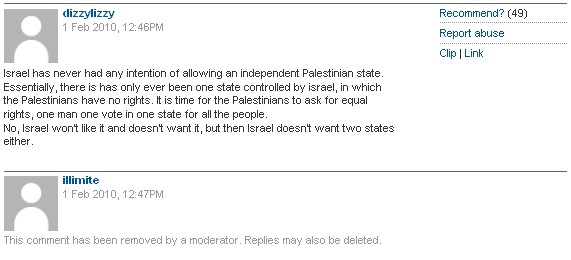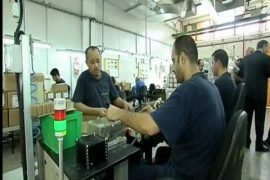The October 17th 2012 edition of the “Today” programme on BBC Radio 4 ran an item by Middle East correspondent Kevin Connolly on the subject of the proposed upgrading of the town of Ariel’s 30 year-old college to university status.
The programme is available for listening here (for a limited period of time), with the item concerned starting around 1:17: 00.
The programme’s presenter John Humphrys introduces the item with the words:
“The Israeli settlement of Ariel was built inside what the rest of the world regards as the occupied Palestinian West Bank”.
Kevin Connolly commences his report by saying:
“In the Israeli settlement of Ariel, built twenty kilometres or so inside what the rest of the world calls occupied Palestinian territory…”
Later – referring to the building of Ariel – Connolly talks of the “accusation that it’s all been done on land stolen from the Palestinians”.
So, less than two minutes into the report, listeners have been informed that Ariel is located in a place called “the West Bank”, which is “occupied” and which is actually “Palestinian”, according to the “rest of the world”.
The term “West Bank” had, of course, never been heard of before the Jordanian invasion, occupation and subsequent – unrecognised – annexation of that area. Even the Arab League refused to recognise Jordan’s territorial claims to the region west of the Jordan River which was – and remains – part of the territory allocated to the establishment of the Jewish National Home by the League of Nations.
Connolly fails to inform his listeners that the 1949 Armistice Agreement signed between Israel and Jordan specifically states – at the insistence of the Arab States which did not recognise the consequences of the war – that the ceasefire line (the ‘green line’) should not be construed in any way as a political or territorial border.
“Article II 2: It is also recognised that no provision of this Agreement shall in any way prejudice the rights, claims and positions of either Party hereto in the ultimate peaceful settlement of the Palestine question, the provisions of this Agreement being dictated exclusively by military considerations.”
“Article VI 9: The Armistice Demarcation Lines defined in articles V and VI of this Agreement are agreed upon by the Parties without prejudice to future territorial settlements or boundary lines or to claims of either Party relating thereto.”
Needless to say, during the 19 years of Jordanian rule over the captured territory, no Palestinian state was established there.
In what is presumably supposed to be a nod to requirements of impartiality, Connolly informs listeners that one of his interviewees – Professor Robert Aumann of the Hebrew University –
“…defends Israel’s right to build on land that others call the occupied West Bank, but that he – like the settlers – prefers to call Judea and Samaria”. [emphasis added]
In other words, Connolly is now suggesting that not only does “the rest of the world” call it the “West Bank”, but that within Israel too, only “settlers” use the term Judea and Samaria.
Of Connolly’s three interviewees in the item, two (Ariel’s mayor, Ron Nachman and Professor Aumann) are in favour of the upgrading of Ariel College – which was established in 1982 – to university status. The third interviewee, Professor Alon Harel, is opposed to the move, with Connolly describing him as saying that:
“Reinforcing the settlers’ grip on the land they hold is a top priority for Israel’s current political leaders”.
Harel himself then says:
“There is a feeling that there is nothing important but the settlements; there is nothing which is of value in Israel but the settlements. […] The success of the settlements is the only project that politicians in Israel – the leading politicians – the government – cares about.”
Many Israelis might be of the opinion that Harel’s words are – to say the least – over the top.
Interestingly, both John Humphrys and Kevin Connolly choose to introduce into the item the subject of the fringe movement promoting the calls for an academic boycott of Israel, but neither of them take the trouble to inform their listeners just how unrepresentative of mainstream opinion that movement actually is.
Humphrys’ introduction to the item includes the claim that the establishment of a university in an existing college in Ariel:
“…will enrage critics of Israel’s settlement policies and perhaps add new fuel to calls for an academic boycott of Israel”
Connolly winds up his report by suggesting that a university in Ariel would “energise”
“… those critics around the world already calling for an academic boycott of Israel in protest at its settlement policies.”
Significantly, Connolly and Humphrys both elect not to clarify the fact that the BDS movement – of which the calls for an academic boycott are part – is about much more than “protest” at “settlements” and that its underlying aim is the dissolution of the Jewish State and the implementation of the ‘right of return‘ to Israel for millions of Palestinian refugees.
The vast majority of Israelis – in accordance with prevailing international opinion – accept that the only viable solution to the Arab-Israeli conflict is that of two states for two peoples and that territorial compromise and exchange on both sides will be a necessary part of that, as proposed in numerous plans – including the one put forward by Israeli PM Olmert in 2008.
Under such proposals, the main blocks of Israeli towns and villages in Judea and Samaria – including Ariel – would remain under Israeli control, with land elsewhere given in exchange.
It is a pity that the BBC does not appear to find it necessary to inform its audience that those ‘absolutists’ (including members of the BDS movement) refusing to engage with pragmatic solutions to the Arab-Israeli conflict in fact represent minority opinion rather than “the rest of the world”. It is even more regrettable that, through selective reporting, the BBC appears to have no qualms about stoking fires to advance the destructive BDS cause.





